

Levothyroxine might be ineffective for 1 in 4 patients — BOOST Thyroid: Hashimoto's and Hypothyroid App. A new study from BOOST Thyroid offers a groundbreaking perspective on how the most commonly prescribed treatment for an underactive thyroid does not relieve symptoms for up to 25% of patients. 1 in 10 patients feel symptoms worsen after taking LevothyroxineFatigue is the most common symptom, affecting eight in 10 patients with no symptom improvement2 in 10 patients on Levothyroxine therapy report experiencing new symptoms.
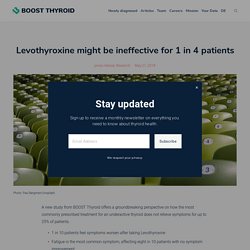
Top 11 Things You Need To Know About Thyroid Medications Plus Thyroid Medication eBook. 20 Medications That Have Been Shown to Cause Memory Loss – REALfarmacy.com. By DEANE ALBAN Prescription drugs cause over 100,000 deaths per year and cause another 1.5 million people to experience side effects so severe they must be hospitalized.

Adverse drug reactions are now the fourth leading cause of death in the US. (1) Every medication carries some risks and memory loss is a very common side effect. If you are taking any prescription medication, the odds are that it falls into one of these three categories of drugs known to cause memory loss and other cognitive problems: The “Anti” Drugs. An Antibiotic That is Worrisome for Thyroid Patients. Ronald Grisanti D.C., D.A.B.C.O., D.A.C.B.N., M.S.
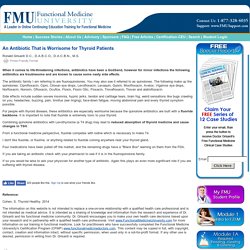
When it comes to life-threatening infections, antibiotics have been a GodSend, however for minor infections the following antibiotics are troublesome and are known to cause some nasty side effects. The antibiotic family I am referring to are fluoroquinolones. You may also see it referred to as quinolones. The following make up the quinolones: Ciprofloxacin, Cipro, Ciloxan eye drops, Levofloxacin, Levaquin, Quixin, Moxifloxacin, Avelox, Vigamox eye drops, Norfloxacin, Noroxin, Ofloxacin, Ocuflox, Floxin, Floxin Otic, Floxacin, Trovafloxacin, Trovan and alatrofloxacin. Side effects include sudden severe insomnia, hypnic jerks, tendon and cartilage tears, brain fog, weird sensations like bugs crawling on you, headaches, buzzing, pain, tinnitus (ear ringing), face-down fatigue, moving abdominal pain and every thyroid symptom possible.
From a functional medicine perspective, fluoride competes with iodine which is necessary to make T4. Reference: Don’t Stop Taking Thyroid Medications – Levothyroxine. Your body needs thyroid hormones to function properly.
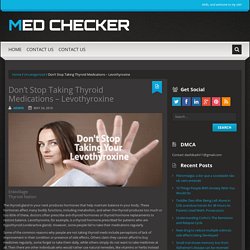
If you have hypothyroidism, you may feel tired all the time and have a puffy face, show heartbeat, and dry skin. You may feel cold even when it is not cold, be constipated all the time, and notice significant weight gain. You need to take your medication (levothyroxine) regularly to correct these imbalances, just like insulin-dependent diabetics need insulin medications. What happens when you stop taking levothyroxine? Home - Get Real Thyroid. Is Your Medication Gluten Free? The benefits of following a gluten free diet with Hashimoto's have been well described.
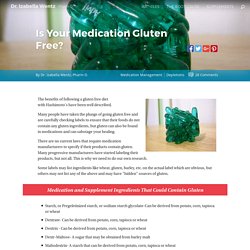
Many people have taken the plunge of going gluten free and are carefully checking labels to ensure that their foods do not contain any gluten ingredients, but gluten can also be found in medications and can sabotage your healing. There are no current laws that require medication manufacturers to specify if their products contain gluten. Many progressive manufacturers have started labeling their products, but not all. This is why we need to do our own research. Neurontin and Lyrica are a Death Sentence for New Brain Synapses: The Saga Continue. BY: Byron J.

Richards, Board Certified Clinical Nutritionist Neurontin and its newer more potent version, Lyrica, are widely used for off-label indications that are an outright flagrant danger to the public. These blockbuster drugs were approved for use even though the FDA had no idea what they actually did in the brain. A shocking new study shows that they block the formation of new brain synapses1, drastically reducing the potential for rejuvenating brain plasticity – meaning that these drugs will cause brain decline faster than any substance known to mankind.
The problem of these drugs is compounded by their flagrant illegal marketing. Even though the marketing of these drugs has been heavily fined, they continue to rack up billions in sales from the off-label uses. The researchers in the above study try to downplay the serious nature of the drugs by saying “adult neurons don’t form many new synapses.” These are the kind of situations the FDA should be all over. What Happens When You Don't Take Your Thyroid Medication? I had an interesting discussion with a friend of mine.
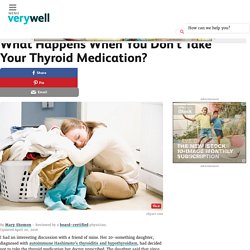
Her 20-something daughter, diagnosed with autoimmune Hashimoto's thyroiditis and hypothyroidism, had decided not to take the thyroid medication her doctor prescribed. The daughter said that since starting her treatment, her irregular, scanty periods had become regular. She liked less frequent periods, and so she decided to stop taking her thyroid hormone replacement medication. She felt that the benefits she'd noticed since starting treatment—losing weight, less hair loss, more energy—were just not worth it. She's not alone in refusing to take her prescribed medications. Which Thyroid Medication Is Best? Lexapro Side Effects in Detail - Drugs.com. Generic Name: escitalopram Note: This page contains information about the side effects of escitalopram.
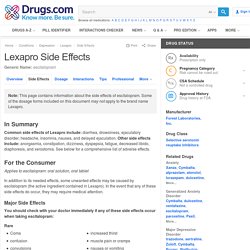
Some of the dosage forms included on this document may not apply to the brand name Lexapro. In Summary.
Low-dose Naltrexone And Hashimoto’s LDN is an FDA-approved medication. Naltrexone is an FDA-approved medication used for opioid withdrawal at a dose of 50 mg per day.
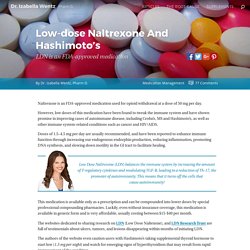
However, low doses of this medication have been found to tweak the immune system and have shown promise in improving cases of autoimmune disease, including Crohn’s, MS and Hashimoto’s, as well as other immune system-related conditions such as cancer and HIV/AIDS. Doses of 1.5–4.5 mg per day are usually recommended, and have been reported to enhance immune function through increasing our endogenous endorphin production, reducing inflammation, promoting DNA synthesis, and slowing down motility in the GI tract to facilitate healing. Low Dose Naltrexone (LDN) balances the immune system by increasing the amount of T-regulatory cytokines and modulating TGF-B, leading to a reduction of Th-17, the promoter of autoimmunity.
This means that it turns off the cells that cause autoimmunity! I decided to interview Dr. IW: What types of people benefit from LDN? IW: How is LDN taken? New Warning About Thyroid Medications. Today is May 18th, 2016, and I wanted to pass on a quick note to you.
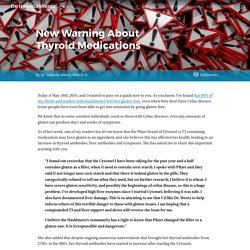
As you know, I’ve found that 88% of my clients and readers with Hashimoto’s feel best gluten-free, even when they don’t have Celiac disease. Some people have even been able to get into remission by going gluten-free. We know that in some sensitive individuals (such as those with Celiac disease), even tiny amounts of gluten can produce days and weeks of symptoms. As of last week, one of my readers has let me know that the Pfizer brand of Cytomel (a T3 containing medication) may have gluten as an ingredient, and she believes this has affected her health, leading to an increase in thyroid antibodies, liver antibodies and symptoms. She has asked me to share this important warning with you. "I found out yesterday that the Cytomel I have been taking for the past year and a half contains gluten as a filler, when it used to contain corn starch. Which Thyroid Medication Is Best? Armour®, Synthroid®, Naturethroid®, NDT, Compounded, Etc. There are quite a few options for thyroid medications for hypothyroidism, however most people are only familiar with synthetic T4-containing thyroid medications.
Some people report feeling better on combination T4/T3 medications (like Armour®, compounded T4/T3 or Nature-Throid®), others may feel better taking synthetic T4 medications (like Synthroid®, Tirosint® or Levoxyl®), while other patients may benefit from a synthetic T3 medication (like Cytomel® ***may be cross-contaminated with gluten***) Conventional physicians will usually prescribe Synthroid® or levothyroxine, a synthetic version of T4.
The T4 hormone is an active thyroid hormone, but it is less physiologically active than T3, and needs to be converted to T3 by our bodies. Many people do very well on Synthroid, Levoxyl and Tirosint (a new T4 medication that is hypoallergenic), once they are dosed appropriately and stabilized. MedHelp. I don't know if you live in US or UK or ? But I live in the UK and am intolerant of synthetic levothyroxine.